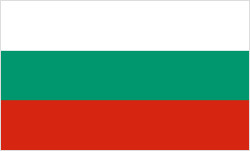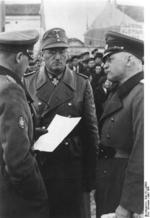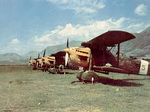
Bulgaria
| Alliance | Axis - Minor Member Nation or Possession | |
| Entry into WW2 | 20 Apr 1941 | |
| Population in 1939 | 6,458,000 | |
| Military Deaths in WW2 | 22,000 | |
| Civilian Deaths in WW2 | 3,000 |
Contributor: C. Peter Chen
ww2dbaseModern Bulgaria began in 1908 when it became independent from the Ottoman Empire. In 1934, a military coup took place, and as a result Tsar Boris III took direct control over the government in the following year by wielding puppet Prime Ministers Georgi Kyoseivanov between 1935 and 1940 and Bogdan Filov after 1940. In Aug 1940, Germany forced the Second Vienna Arbitration on the Balkan States to prevent a war between Hungary and Romanian; this agreement saw the transfer of the southern Dobrudja region from Romania to Bulgaria, a previously Bulgarian territory lost to Romania in 1913, and it drew many Bulgarian politicians more in favor of Germany. In the early years of the European War, Tsar Boris III and Prime Minister Filov refused to become a belligerent, however, and publicly declared neutrality. Nationalistic movements, citing the Second Vienna Arbitration success and demanding further territorial gains, gradually pushed Bulgaria closer to Germany and Italy, ultimately resulting in Bulgaria joining the Tripartite Pact on 1 Mar 1941. Bulgaria joined the war on 20 Apr 1941 when its troops crossed its southern border into Greece, taking Serrai, Kavala, Xanthi, and Komotini, and gaining access to the Aegean Sea. When Germany invaded the Soviet Union two months later, unlike other minor Axis nations, Bulgaria did not dispatch troops to take part in Operation Barbarossa, although Bulgarian ships did engage in fighting with Soviet warships that attacked Bulgarian shipping in the Black Sea. On 13 Dec 1941, Bulgaria declared war on the United Kingdom and the United States as demanded by Germany.
ww2dbaseIn Aug 1943, Tsar Boris III died of a heart failure, and his six-year-old son took the throne as Tsar Simeon II, with Filov, Prince Kyril, and Lieutenant General Nikola Mihov serving as regents and Dobri Bozhilov as the new prime minister. Between 1943 and 1944, Bulgaria was largely a German-sponsored puppet state. While Bulgaria passed its share of anti-Semitic policies starting in 1940, it successfully protected its 50,000 Jewish citizens from being deported to German-run concentration camps. Bulgaria did not extend similar protection to Jews in Greek territories it occupied; nearly 12,000 Jews in the occupied Greek territories were deported to Auschwitz Concentration Camp and Treblinka Concentration Camp in 1943.
ww2dbaseIn Aug 1944, the Bulgarian Fatherland Front began a successful armed rebellion against the government that, after driving out German troops by the end of the month, welcomed Soviet troops into its borders. On 8 Sep 1944, Bulgaria formally switched sides and declared war on Germany. Three Bulgarian armies, consisted of 455,000 men, marched with the Soviets in the Belgrade Strategic Offensive Operation which saw the capture of Belgrade, Yugoslavia and the cut-off of German troops in northern Greece; they would continue their advance into Hungary and Austria.
ww2dbaseA Soviet authority was established in Bulgaria which answered to the Soviets in Moscow, Russia in late 1944. In Feb 1945, Prince Kiril and hundreds of Bulgarian officials were arrested by the Soviets on war crimes charges, and many of them, including Prince Kiril, would be tried and executed within months. With the establishment of the People's Republic of Bulgaria, Tsar Simeon II and the royal family were exiled in Sep 1946; the former monarch lived in Spain as Simeon Borisov through the Cold War, returned to Bulgaria in 1990, and was ultimately elected prime minister in 2001 (he lost the 2005 election). In 1947, the Paris Peace Treaties included southern Dobruja as part of Bulgaria, thus making Bulgaria the only Axis nation to gain territory at the conclusion of WW2.
ww2dbaseSource: Wikipedia
Last Major Update: Jan 2013
| People | ||
| Boris | Filov, Bogdan | Muraviev, Konstantin |
| Bozhilov, Dobri | Georgiev, Kimon | |
| Events Taken Place in Bulgaria | ||
| Bulgaria Switched Sides | 26 Aug 1944 - 8 Sep 1944 | |
Photographs
 |  |  |  |
Please consider supporting us on Patreon. Even $1 per month will go a long way! Thank you. Please help us spread the word: Stay updated with WW2DB: |

- » Evergreen Museum and Obon Society Working on Returning Undelivered 1945 Mail to Japanese Families (5 Sep 2025)
- » Wreck of Teruzuki Found (27 Jul 2025)
- » USS Orlean's Bow Found (22 Jul 2025)
- » The Emperor of Japan Planned to Honor WW2-era Japanese POWs in Mongolia (4 Jul 2025)
- » US State Lawmaker John Winter Caught Using Racial Slur "Jap" and Apologized (11 Jun 2025)
- » See all news
- » 1,182 biographies
- » 337 events
- » 45,131 timeline entries
- » 1,249 ships
- » 350 aircraft models
- » 207 vehicle models
- » 376 weapon models
- » 123 historical documents
- » 261 facilities
- » 471 book reviews
- » 28,434 photos
- » 365 maps
Thomas Dodd, late 1945
Please consider supporting us on Patreon. Even $1 a month will go a long way. Thank you!
Or, please support us by purchasing some WW2DB merchandise at TeeSpring, Thank you!